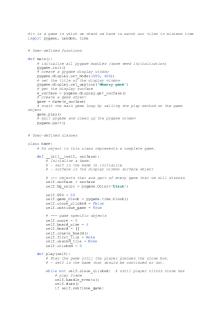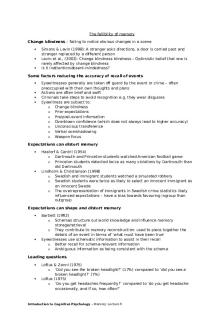Chapter 6 Memory PDF

| Title | Chapter 6 Memory |
|---|---|
| Author | Emma Hupe |
| Course | Introduction to Psychology |
| Institution | University of South Carolina |
| Pages | 3 |
| File Size | 46.7 KB |
| File Type | |
| Total Downloads | 20 |
| Total Views | 136 |
Summary
Prof Sterling Watson...
Description
CHAPTER 6 ________________________ Memory- cognitive process that includes encoding, storage, and retrieval of information ● Encoding: transforming information into a form that can be stored in memory ● Storage: keeping or maintaining information in memory ● Retrieval: bringing to mind information stored in memory 3 Memory Systems 1. Sensory memory: temporary storage with large capacity and only lasts a few seconds 2. Short term memory: brief storage for info currently being used, about 7 items at a time, less than 30 seconds, codes info according to sound a. Displacement: when short term mem is filled to capacity b. Chunking: grouping or organizing info into larger units c. Rehearsal: act of purposely repeating to maintain info in short term memory 3. Long term memory: permanent or relatively permanent, unlimited capacity, from minutes to a lifetime a. Declarative memory- explicit memory i. Episodic memory- remembering trips and experiences ii. Semantic memory- brain dictionary, remembering capitals, names, facts b. Nondeclarative Memory i. Motor skills ii. Classically conditioned responses 4. Working memory: memory subsystem used when trying to understand, remember, use info to solve problem or communicate a. Maintenance rehearsal (shallow) what does it sound like? b. Elaborative rehearsal (deep) what does it mean? Information can be lost through-> decay, displacement, interference, encoding failure, consolidation failure, motivated forgetting, retrieval failure 3 types of memory tasks 1. Recall- producing required info by searching memory, hints from retrieval cues 2. Recognition- identifying material as familiar or having encountered before 3. Relearning- retention expressed as the percentage of time saved when material is relearned Reconstruction: account of an event pieced together from a few highlights, using info that may or may not be accurate ● Schemas ○ Effect how people encode and recall info ○ Influence new learning ● Distortion ○ Positive bias Memory in daily life
● ●
Flashbulb memory- vivid emotionally connected memories Photographic memory- memory of images ○ Eidetic imagery- remembering things you see Cultural Memory - Easier to remember things that are important to ones culture Eyewitness Testimony ● Loftus- highly subject to error ● Influenced by misinformation effect ● Confidence in testimony does not indicate accuracy Repressed memory controversy ● Critics say techniques used implant false memories, infantile amnesia ● Supporters say it can successfully treat psychological problems Hippocampus: forms episodic memories Hippocampal region: forming semantic memories Long-term Potentiation: increase in efficiency of neural transmission at the synapses - Lasts for hours or longer - Possible basis for learning and memory at the level of neurons Fear Associated hormones: can cause memories of threatening situations to be more powerful than other memories Frightening stimulus→ adrenals stimulated → enhanced memory consolidation Amnesia: partial or total loss of memory - Anterograde - Retrograde Dementias: - Degenerative brain processes that diminish ability for brain to remember and process information (alzheimer’s) Forgetting: the inability to recall something that you could previously recall Ebbinghaus- memorized nonsense syllables and measured retention after varying intervals of time using relearning method - Forgetting was rapid at first then tapered off
Improving memory 1. Organization- provides retrieval cues for info
2. Overlearning- practicing or studying material beyond the point where it can be repeated once without error 3. Spaced practice- learning in short practice sessions with rest periods in between 4. Recitation- more effective than simply rereading newly learned material...
Similar Free PDFs

Chapter 6 Memory
- 3 Pages

Chapter-6-Memory - notes
- 9 Pages

Tulving - chapter: the memory
- 1 Pages

Memory File - Lecture notes 6
- 5 Pages

Chapter 7 Notes - Memory
- 5 Pages

Chapter 8: Memory Notes
- 5 Pages

Chapter 5 Memory
- 6 Pages

Chapter 7 Memory Notes
- 8 Pages

Chapter 7 Memory Notes
- 3 Pages

Memory
- 3 Pages

Memory
- 5 Pages

Chapter 3 Learning and Memory
- 20 Pages

Virtual Memory
- 58 Pages
Popular Institutions
- Tinajero National High School - Annex
- Politeknik Caltex Riau
- Yokohama City University
- SGT University
- University of Al-Qadisiyah
- Divine Word College of Vigan
- Techniek College Rotterdam
- Universidade de Santiago
- Universiti Teknologi MARA Cawangan Johor Kampus Pasir Gudang
- Poltekkes Kemenkes Yogyakarta
- Baguio City National High School
- Colegio san marcos
- preparatoria uno
- Centro de Bachillerato Tecnológico Industrial y de Servicios No. 107
- Dalian Maritime University
- Quang Trung Secondary School
- Colegio Tecnológico en Informática
- Corporación Regional de Educación Superior
- Grupo CEDVA
- Dar Al Uloom University
- Centro de Estudios Preuniversitarios de la Universidad Nacional de Ingeniería
- 上智大学
- Aakash International School, Nuna Majara
- San Felipe Neri Catholic School
- Kang Chiao International School - New Taipei City
- Misamis Occidental National High School
- Institución Educativa Escuela Normal Juan Ladrilleros
- Kolehiyo ng Pantukan
- Batanes State College
- Instituto Continental
- Sekolah Menengah Kejuruan Kesehatan Kaltara (Tarakan)
- Colegio de La Inmaculada Concepcion - Cebu


